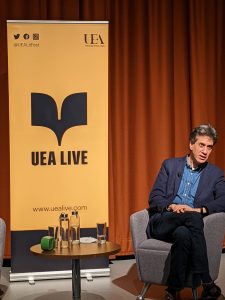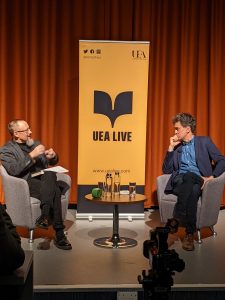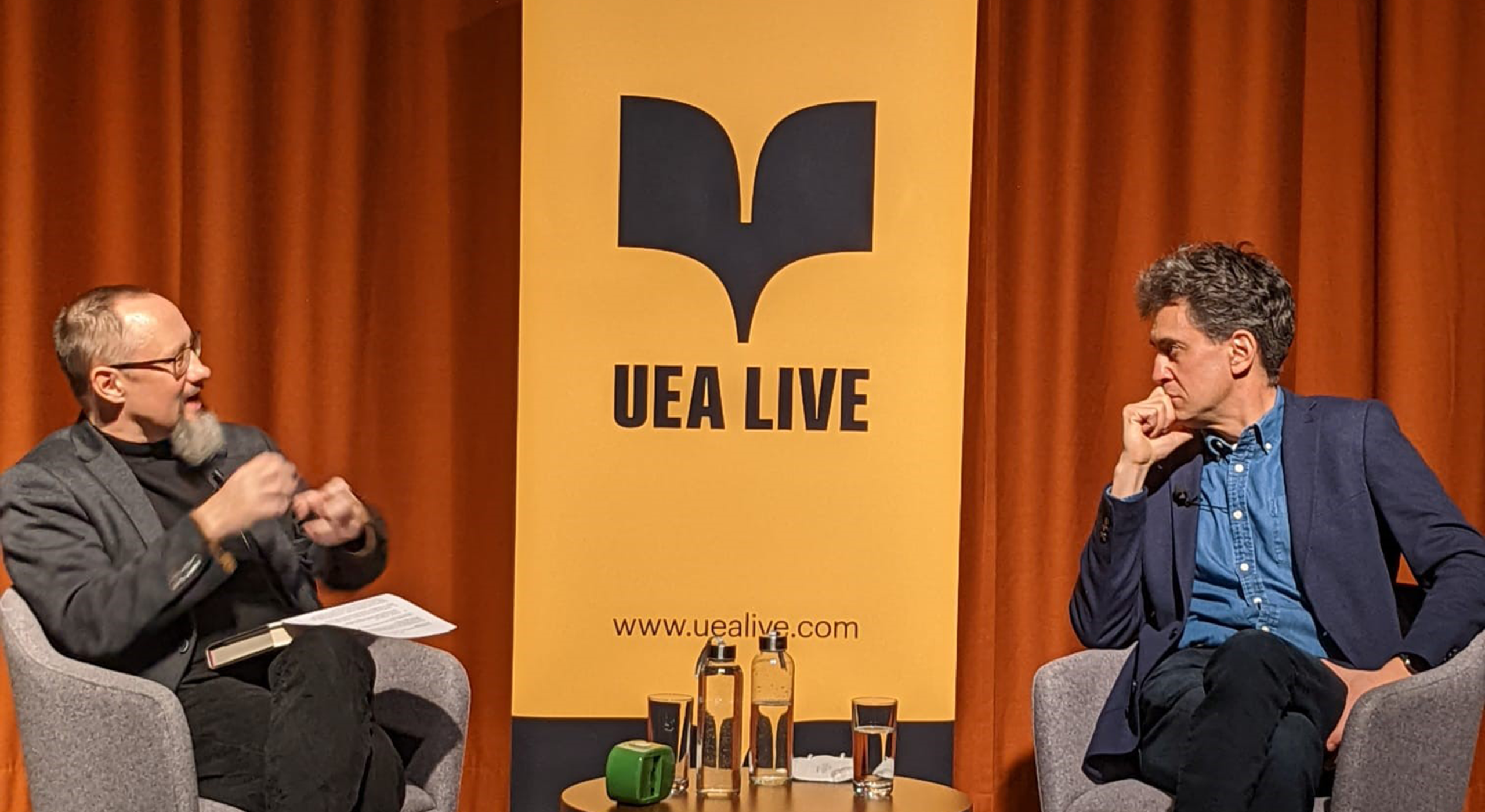Ed Miliband at UEA Live: Finding Hope over Pessimism in Politics
Written for UEA Live by Alex Showell

Ed Miliband at UEA Live
Bringing the autumn schedule of this year’s UEA Live to a close, politician Ed Miliband discussed his book Go Big: How to Fix the World, and its vision on how the multitude of problems we face today – politically, environmentally and socially – can move towards resolution in the small actions and ideas already achieved or presented in communities, movements, economies and governments both within the UK and around the world.
Led by UEA’s Political and Social Theory Professor Alan Finlayson, the discussion began around the creation of the book from Miliband’s own political career and outlook, especially how, after the 2015 general election defeat, he stayed in politics because he felt he had more to say. He also mentioned his own willingness to learn and look elsewhere to find people and movements already working with solutions and ideas that are creating social change. I was particularly interested in Miliband’s discussion around the political atmosphere towards this willingness to learn and how parts of the culture of politics see this as a weakness. Describing our politics as ‘parochial’, Miliband passionately offered an alternative by recognising how others work and what solutions and ideas they formulate can aid our own social change. This candid dissection of parts of the political consciousness was a refreshing perspective on the current political landscape we inhabit, especially in times that seem as politically charged as ever, even more so with the current political scandals and upcoming legislation which seemed to offer a more visceral sensitivity to the talk.
Miliband offered hope. His podcast Reasons to be Cheerful and his book are the two main conduits for this, but within the talk, Miliband was a third conduit. His recognition and dissection of the political systems that alienate many due to the Westminster bubble and the oppressive forces of the many social, economic, environmental and political issues that press down on the fabric of society allowed a nuanced and candid discussion around how to instigate change but also the optimism of getting there. He explained how within the book he showcased ideas and solutions that are already bringing change elsewhere, such as movements like #BlackLivesMatter and the Preston model of community wealth-building, and how instigating how these models work and interact with politics, community and economics can lead to a better society.

Alan Finlayson and Ed Miliband at UEA Live
A returning topic was this political landscape we inhabit, touching on ideas of authenticity – which Miliband recognised as a loaded concept – and the shift in politics over the last ten years. Miliband highlighted the political aspect of speaking to the moment and the current moment being one of a sense of pain and discontent towards the system, one which the Conservatives, helmed by the projected personality of Boris Johnson, tapped into, regardless of whether they would actually enact everything they pledge (which Miliband is certain they won’t) and which has brought on the current government and political situation. But, recognising this sense of wanting a new beginning, as highlighted by the discourse surrounding the Brexit referendum, was something Miliband insisted Labour needed to identify with to regain those they’ve lost.
In a question surrounding whether there is a nostalgia towards the Blair era of Labour; whether present Labour is looking to recreate that of 1997; and whether this is tenable in the current political landscape, Miliband affirmed how the challenges and scope of politics are much bigger and different to that of the New Labour era: the ‘playbook from then is not the answer now.’ His book reaffirms the point of the different agency of politics now. It is no longer two-party politics; politics is beyond that and electing the right government is no longer enough. To hear this from a member of the Shadow Cabinet, who inhabits the political space of opposing the government and seeking election, was surprising, and one which Finlayson pointed out too. Miliband’s attention to the answer of political and social change lying within a coalition between party politics and social movements, like those highlighted in his book, reiterated his hope towards the betterment of society. Miliband offered an optimistic voice of recognition towards the need to give a voice and autonomy to the social movements and ideas seeking change whilst also recognising his ability as a member of parliament to marry this social action to his own politics but also to the political sphere. His agreement towards change being able to come from social action and away from party politics was intriguing. Highlighting the rise of #BlackLivesMatter, LGBTQ+ rights, and the discussions around net zero across his own political career, Miliband concisely showed the fluidity and materialisation of social change due to movements and not necessarily the political systems.
Miliband’s observation of politics having an outdated ‘individualistic model of leadership,’ seemed to aptly permeate within the scope of current political stories and the Johnson government. As expected, he isn’t a fan of Boris Johnson and called him an ‘opportunist’ in reference to his previous articulation on speaking to the moment. However, Miliband didn’t just point to the problems but again he suggested how to change this model to the one his book showcases of the possibility of combining the efforts social movements and ideas with the parliamentary system. Again, his optimism radiated.
The conversation closed on Miliband’s belief in equality being a motivation in his politics, but also his recognition that equality has to be led by people’s voices as an ability to affect change. It was an empowering moment that led to the simplistic crux of this engaging talk: people joining together can lead to change.
A Q&A session followed and upturned more interesting dynamics. Discussing the climate and the questions around if the 1.5°C change is dead, reinstated Miliband’s position of COP26 being a disappointing spin operation, but also his optimism of persistence in trying. Another question discussed the impacts of social media and the decline of local media on political dialogue. Miliband recognised the dangers of alternative facts and the bitterness of social media like on Twitter. But also, he noted the paradox of social media offering opportunities for people to create these community structures that can enact change. Miliband then showed his optimism again in politics. Yes, political topics can seem relentless and gloomy but he takes comfort in the flow of history and the ‘positive change you see in society’ and the solidarity you get with the people you meet. He saw a new script to be written for the country and believes we are still finding the new settlement in politics and there is a fighting chance of doing it, in regard to the climate, equality, economics and society.
The Q&A closed on Miliband’s acceptance of his optimism, and something that I personally felt and what I thought people would benefit from in their acts of interpreting politics: ‘you might as well go for hope as pessimism is pretty bleak.’ Miliband offered reassurance and hope, which is maybe the first step in going big and fixing the world.
Alex Showell is a third-year English Literature with Creative Writing student at UEA, originally from the Black Country town of Dudley. He reads whatever he can get his hands on and writes fiction around identity, intersectionality, and the small moments in life. In his spare time, he enjoys live music, watching Doctor Who, and since becoming vegan has found a new love for cooking.

